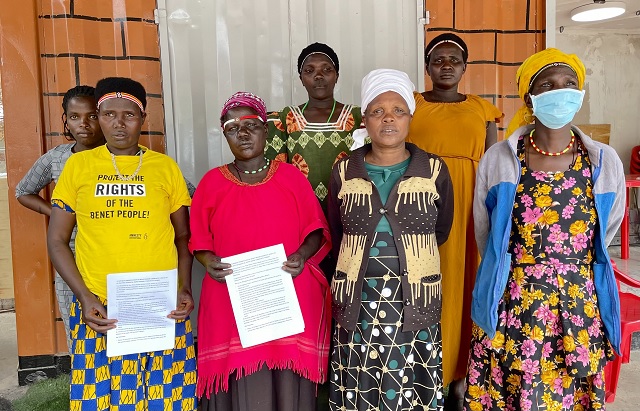
Kampala, Uganda | RONALD MUSOKE | The African Commission on Human Rights has called upon authorities in Uganda to stop violating the rights of the indigenous Benet people of eastern Uganda.
The Commission also wants the government of Uganda to investigate all the violations against the Benet people and disclose publicly the outcomes of such inquest as well as compensate victims and hold perpetrators to account.
The Benet are a community of about 20,000 people who lost their ancestral land in the Mountain Elgon area of Sebei, in eastern Uganda in the 1930s when the British colonial protectorate classified the moorland and grasslands of this mountain as a forest reserve.
Subsequent post-colonial governments have since piled more violations on the Benet including violent forced evictions since 1983, further deepening the plight and poverty of this community.
Solomon Ayele Dersso, the chairperson of the Working Group on Indigenous Populations/Communities and Minorities in Africa noted in a recent statement that the Commission has been concerned about reports of several acts of violence, intimidation, threats, sexual assault, destruction, and confiscation of property by the members of the Uganda Wildlife Authority (UWA) — Uganda’s top national agency— in the process of enforcing the country’s conservation laws and policies.
The African Commission noted in its statement that it was particularly concerned by the reports it got which revealed escalations in violence against the Benet during the months of July and August, this year, following the community’s organization of peaceful assemblies to reclaim their ancestral land.
“The African Commission is gravely concerned that such actions by UWA amount to grave danger to various rights of the members of this community, including their rights to: life, bodily integrity, justice, freedom of assembly, property, culture, family, existence and natural resources.”
The African Commission also called upon the Ugandan government to fully recognise the rights of the Benet over their ancestral land as is enshrined in the African Charter and to guarantee an integrated conservation approach.
The African Human Rights Commission has been welcomed by representatives of the Benet who are also known as the Mosopisyek— an extremely vulnerable ethnic minority group found in the Sebei sub-region of eastern Uganda.
David Chemutai, the Coordinator of the Benet Mosop Community Association (BMCA)—a grassroots organisation that works to advance the rights of the Benet— welcomed the statement of the African Commission on Human and Peoples’ Rights as timely and urged the Ugandan government to take action.
“The Government of Uganda should recognize the rights of Mosopisyek of Benet as the indigenous custodians of our land. Eviction and human rights abuses done by UWA (must) be stopped. We also ask the government to resolve the resettlement question of the Benet.”
The African Commission’s call to action was also welcomed by the Minority Rights Group International, a London-based human rights organization that works to secure the rights of ethnic, religious and linguistic minorities and indigenous people around the world.
In Uganda, MRG works closely with the Benet people to secure their land rights, and improve health and education outcomes in their communities, which are often poorly served by these public goods and services.
Agnes Kabajuni, MRG’s Africa Regional Manager said reports of human rights abuses against the indigenous Benet have persisted and the African Commission on Human and Peoples’ Rights adding their voice on the matter should compel the Ugandan Government to act.
“The Benet people have been subjected to suffering for a long time, and it is prudent that the Ugandan government urgently moves to protect their rights. The statement from the African Commission on Human and Peoples’ Rights emphasises the urgency of this matter,” she said.
Century of injustice
The injustice against the Benet goes as far back as pre-independence Uganda, when in the 1930’s; the British colonial government began driving them off their ancestral lands to pave way for wildlife conservation.
Eventually, most of the Benet’s ancestral land was gazetted as Mount Elgon National Park, intensifying decades of evictions. The indigenous minority group has since suffered human rights abuses by the Uganda Wildlife Authority (UWA) in the temporary settlements they occupy.
In 2003, representatives of the Benet in conjunction with some civil society groups in Kampala sued the government against these injustices and in 2005; court ruled that the Benet have a legal right to access their ancestral land.
Despite this ruling, the government is yet to implement this ruling. In July, this year, a group of indigenous Benet women presented a list of grievances to the Office of the Prime Minister in Kampala.
In November, last year, Amnesty International, the London-based human rights non-profit also called upon the government to recognize the Benet as the indigenous inhabitants of the Mountain Elgon forest from which it evicted them. Amnesty International made the demand in a report titled, “13 Years in Limbo: Forced Evictions of the Benet in the Name of Conservation.”
The treatment of the Benet is a flagrant violation of Uganda’s constitution and its own international human rights obligations,” said Deprose Muchena, Amnesty International’s Regional Director for East and Southern Africa. Amnesty International referred to the Benet’s plight as “a multi-generational struggle.”
 The Independent Uganda: You get the Truth we Pay the Price
The Independent Uganda: You get the Truth we Pay the Price





